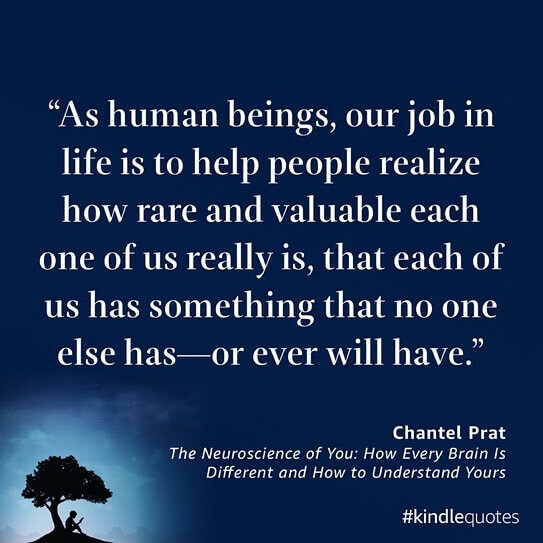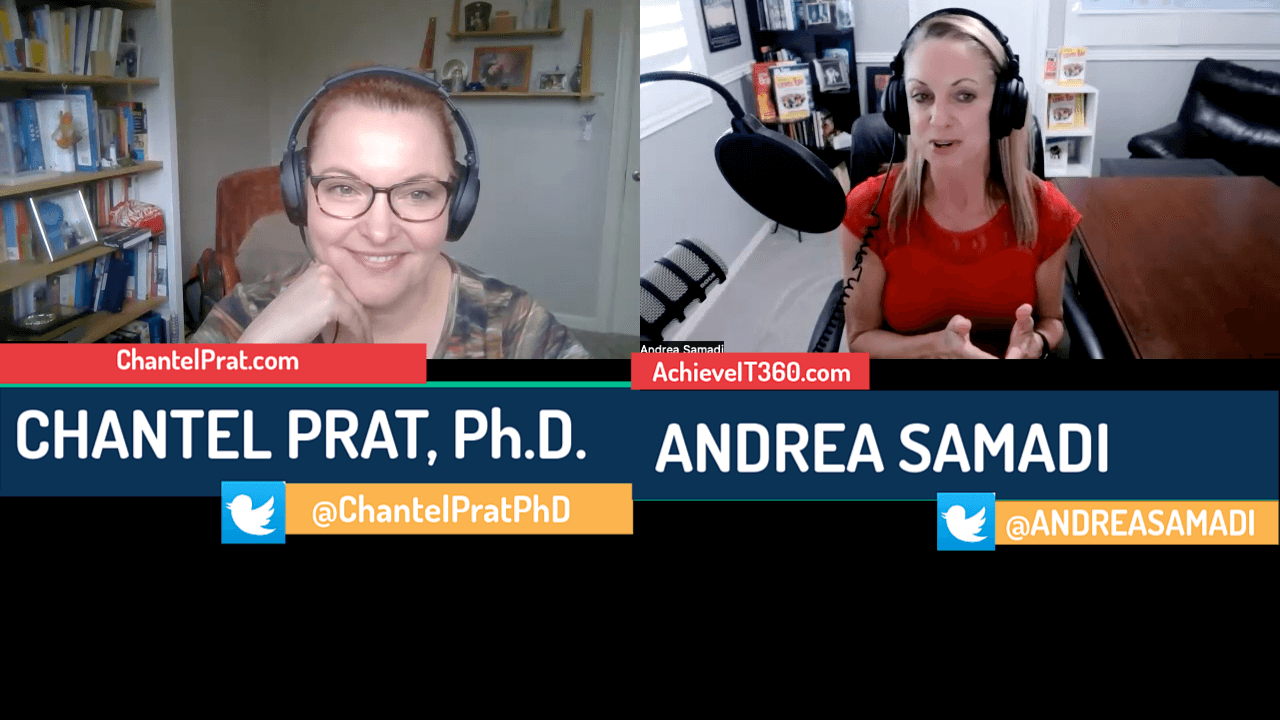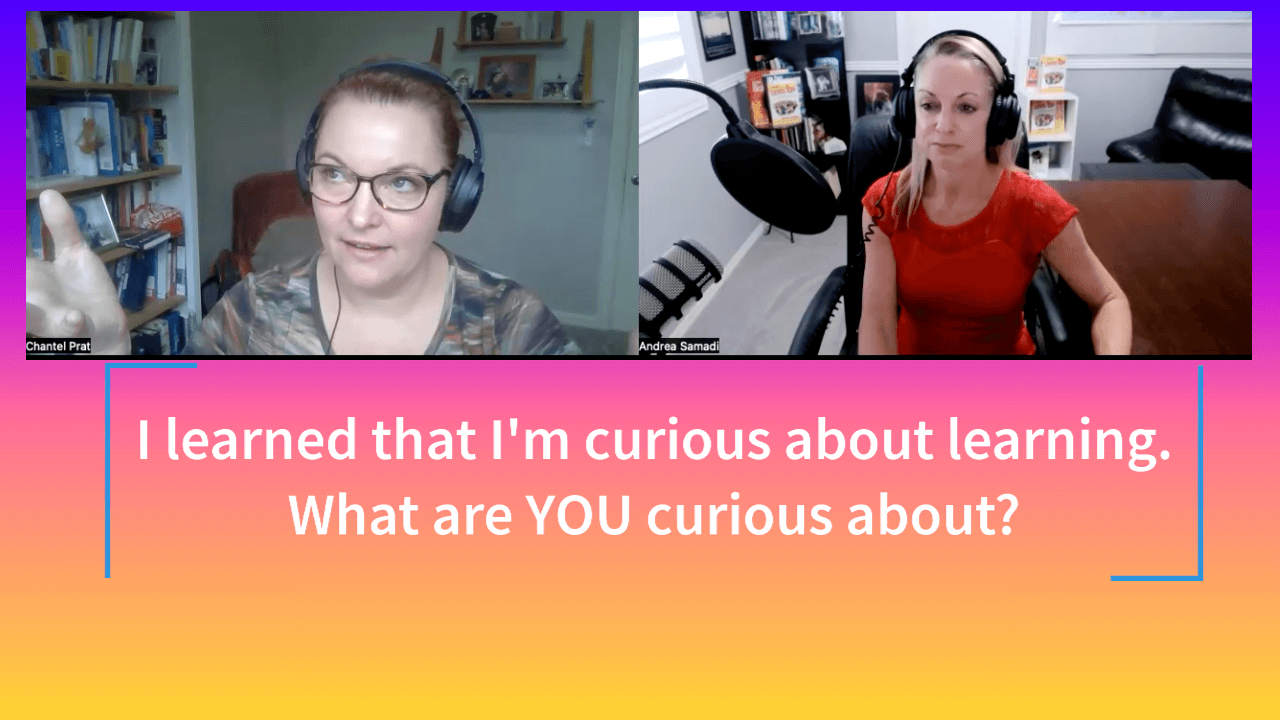“As human beings, our job in life to help people realize how rare and valuable each of us really is, that each of us has something that no one else has—or ever will have.” Chantel Prat, PhD who quotes Fred Rogers, in her new book, The Neuroscience of You.
Watch this interview on YouTube here https://youtu.be/JCpD9vGe4As

On this episode we will learn:
✔ How to understand ourselves better, before understanding others, with our brain in mind.
✔ Why Dr. Anna Lembke said "The Neuroscience of You" is "smart, funny, and irreverent" and a "must read for any budding neuroscientists out there."
✔ What happens at our brain level when we are out of synch with someone else?
✔ A review of Theory of Mind and why it's crucial for our success and "predicts the way a team will perform."
✔ How to improve our Theory of Mind and learn how to "Read the Mind" in others.

Welcome back to The Neuroscience Meets Social and Emotional Learning Podcast where we bridge the gap between theory and practice, with strategies, tools and ideas we can all use immediately, applied to the most current brain research to heighten productivity in our schools, sports environments and modern workplaces. I’m Andrea Samadi and launched this podcast to share how important an understanding of our brain is for our everyday life and results. My vision is to bring the experts to you, share their research, books, ideas and resources to help you to implement their proven strategies, whether you are a teacher working in the classroom or in the corporate environment.
For today’s EPISODE #255, we will be speaking with Dr. Chantel Prat, Ph.D.,[i] who I’ve mentioned a few times on this podcast. I came across Dr. Prat’s NEW book, The Neuroscience of You[ii] that she just released this August while researching for EP #245 back in September, on “Using Neuroscience to Recognize Individuality and Uniqueness”[iii] because her name kept coming up when I was searching for “using neuroscience to understand diversity.” When I started reading her book, it was clear to me that Dr. Prat is heavily invested in the research that helps all of us to first of all understand ourselves on a deeper level, which will help us to understand others. If you look at the Levels of Consciousness Model that I drew out from EP 151, you can see that I have listed Dr. Prat’s work in the fully aware column, as I think this is what her work prepares us for. While you can see our podcast has touched on different levels of consciousness, and since this is such a difficult concept that many scientists still cannot explain, I think it makes things easier if we can map concepts out so we can see what we are talking about visually. I know that after today’s episode, Dr. Prat will open our eyes and awareness a bit more to see who we are, in relation to those around us, with some new ideas for creating synergy with those we are no in synch with.
Here’s a bit about Dr. Prat.
Chantel Prat is a Professor at the University of Washington in the Departments of Psychology, Neuroscience, and Linguistics, and at the Institute for Learning and Brain Sciences, the Center for Neurotechnology, and the Institute for Neuroengineering. A cognitive neuroscientist by training, her interdisciplinary research investigates the biological basis of individual differences in cognition, with an emphasis on understanding the shared neural mechanisms underpinning language and higher-level executive functions.
In English…I would translate that to “Dr. Prat helps us to understand ourselves and others” which is why she kept coming up when I was search for understanding unique differences, or that all brain are not alike.
Dr. Chantel Prat was the first neuroscientist to directly link two human brains through technology. Her research has explored virtual reality, neural linking, and the diversity of our brains throughout development. Learning about the science of our brains and nervous systems empowers us with greater ability to build the lives we want. Some of the power within Dr. Prat's work is that she highlights that neuroscience truly is not a one size fits all field. As Dr. Chantel Prat explains, "being equal does not require us to be the same."
She is featured in the 2019 documentary, I Am Human and her studies have been profiled in media ranging from Scientific American, Psychology Today, and Science Daily to Rolling Stone, Popular Mechanics, Pacific Standard, Travel + Leisure, and National Public Radio.
Let’s meet Dr. Chantel Prat, and see what we can learn about embracing each other’s differences, at the brain level, and what this really means and looks like. I’m sure this discussion will change our perspectives of how we think of others who we aren’t on the same page with, and hopefully help us to all find common ground with those we work with, live with and interact with on a daily basis, with some new strategies to improve our daily results, with our brain in mind.
Welcome Dr. Prat, thank you for coming on the podcast today, and sharing a deeper look at your NEW book, The Neuroscience of You, that I’ve already been promoting since I saw it come out this summer.
Intro Question: Dr. Prat, I’ve already mentioned you many times on this podcast, tying your work to past episodes and speakers, but what caught my eye while reading your book, and researching you further, was the reason “Why” you wrote this book. What was it that motivated you to dive into the importance of understanding ourselves better, as well as others, with our brain in mind?
Q1: When I saw Dr. Anna Lembke’s review of your book, that it’s a began with “smart, and funny” which is not a usual combination for books about the brain, and a “must read for any budding neuroscientists out there and anyone else who wants to know how our brains work and why it matters.” (This review says a lot about you, your work and ability to connect with everyone who want to learn this topic that can be difficult, dry and confusing). We had Dr. Lebmke on the podcast last September for EPISODE #162 on her book Dopamine Nation[iv] and going on the theme of her insightful review of your book, I wondered what would you say is important for us to all know (Neuroscience 101) BEFORE we read what was also noted to be “one of the best books on neuroscience for the lay person.”
Q2: Dr. Prat, when I heard you mention “Theory of Mind” as something that can predict how well a team will perform, you took me back to one of our early episodes #42 with Dr. John Medina the author of “Brain Rules”[v] mentioned Theory of Mind in our interview, with ways we can all improve it, in order to relate to others on a deeper level. What happens to us initially when someone’s brain is making them behave in a way that we don’t understand, and why is being able to “model the mind of someone else” crucial for our success, like you said “it most predicts the way a team will perform?”
Q2B: I took a stab at writing an episode when I first launched this podcast on Theory of Mind, back in March 2020[vi] that talks about when I first learned about ToM when I asked my Mom to explain to me how I could recognize a murderer from a regular person, as there were these horrific murders in Toronto happening at the time, and the killers didn’t “look” like bad people to me. My Mom, I’m not kidding gasped when I asked her this, and said “did you not look at their eyes?” which led to her working with me every week on reading facial cues, and reading the mind in someone’s eyes. John Medina talked about ways we could improve this skill (he said by reading literary fiction books and studying well crafted, award winning writing). What do you think? How can we further improve our ToM, and how can this tool help us all to connect with others on a deeper level/improve our results or even keep us away from bad people?
Q3: In PART 1 of the book you describe some of the biological features that shape the way we experience our personal reality. I LOVE this concept you mention about story-telling, as I worked 6 years in the motivational speaking industry, that’s all about the importance of “the stories we tell ourselves” or keeping a positive mindset or even being careful of the things we say out loud that could be limiting. Until seeing your book, I didn’t realize just how integral our brain’s design is for shaping our story-telling process. Can you explain what how our brain creates and produces the stories we experience, and how can we use an understanding of our brain to create the story with the outcome that we desire? (Landing the successful job, or achieving a huge win at work).
Q4: Is there anything important that I’ve missed?
Dr. Prat, I want to thank you very much for coming on the podcast, and sharing your deep and thorough research that you’ve been doing over the years and explaining it in such a way that we can all understand and use it, in a way that’s been fun, entertaining and memorable. Thank you so much for this.
For people to connect with you, and buy your book, is the best place to go to your website? https://www.chantelprat.com/
Thank you!
Final Thoughts:

I had no idea while writing these questions for Dr. Prat that I would learn so much about myself. She really did have it right. Her book is called The Neuroscience of YOU for a reason, and I hope as YOU read the book that you learn something about yourself, that helps you to understand others. I also highly recommend going to Dr. Prat’s website and taking the Reading the Mind in the Eyes test. I did talk about this on EP #36 but see how you do, and see if you can take what you’ve learned here, or when you’ve said “I’m not wired that way” to understand what exactly that means for YOUR brain.
RESOURCES:
Chatel Prat, How Every Brain is Wired Different and How to Understand Yours Talks at Google Published August 26, 2022 https://www.youtube.com/watch?v=idloD9qYYCE
Chantel Prat on The Curious Minds at Work Podcast with Gayle Allen https://www.gayleallen.net/cm-223-chantel-prat-on-how-every-brain-is-different/
Research https://www.chantelprat.com/research.html
Social Intelligence Test Scored 28/36 http://socialintelligence.labinthewild.org/
FOLLOW CHANTEL PRAT
Website https://www.chantelprat.com/
Twitter https://twitter.com/ChantelPratPhD
BUY The Neuroscience of You https://www.penguinrandomhouse.com/books/624256/the-neuroscience-of-you-by-chantel-prat/
FOLLOW ANDREA SAMADI:
YouTube Channel: https://www.youtube.com/c/AndreaSamadi
Website https://www.achieveit360.com/
LinkedIn: https://www.linkedin.com/in/samadi/
Facebook: https://www.facebook.com/Achieveit360com
Neuroscience Meets SEL Facebook Group https://www.facebook.com/groups/2975814899101697
Twitter: https://twitter.com/andreasamadi
Instagram: https://www.instagram.com/andreasamadi/
RESOURCES:
Two Years Later, We Finally Know Why People Saw “The Dress” Differently by Pascal Wallisch Published April 12, 2017 https://slate.com/technology/2017/04/heres-why-people-saw-the-dress-differently.html#:~:text=Remember%2C%20the%20dress%20is%20actually,Because%20shadows%20overrepresent%20blue%20light.
REFERENCES:
[i] https://www.chantelprat.com/
[ii] The Neuroscience of You: How Every Brain is Different and How to Understand Yours by Chantel Pratt, Ph.D published August 2, 2022 https://www.amazon.com/Neuroscience-You-Every-Different-Understand/dp/1524746606
[iii] Neuroscience Meets Social and Emotional Learning Podcast EPISODE #245 on ““Using Neuroscience to Recognize Individuality and Uniqueness”
[iv]Neuroscience Meets Social and Emotional Learning Podcast EPISODE #162 with Dr. Anna Lembke on “Dopamine Nation: Finding Balance in the Age of Indulgence” https://andreasamadi.podbean.com/e/medical-director-of-addictive-medicine-at-stanford-university-dr-anna-lembke-on-dopamine-nation-finding-balance-in-the-age-of-indulgence/
[v]Neuroscience Meets Social and Emotional Learning Podcast EPISODE #42 with John Medina on his book “Brain Rules” https://andreasamadi.podbean.com/e/dr-john-medina-on-implementing-brain-rules-in-the-schools-and-workplaces-of-the-future/
[vi]Neuroscience Meets Social and Emotional Learning Podcast EPISODE #46 on “Mind-Reading: Developing Theory of Mind in Your Daily Life: As Close as Brain Science Gets” https://andreasamadi.podbean.com/e/as-close-to-mind-reading-as-brain-science-gets-developing-and-using-theory-of-mind-in-your-daily-life/
No comments yet. Be the first to say something!